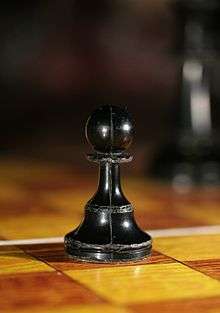Definify.com
Definition 2026
Pion
pion
pion
English
Noun
pion (plural pions)
- (physics) Any of three semistable mesons, having positive, negative or neutral charge, composed of up and down quarks/antiquarks.
Synonyms
Translations
Anagrams
Afrikaans
Noun
pion (plural pionne, diminutive pionnetjie)
- (chess) pawn; least valuable piece in chess
- a pawn; a person who has no control over their lot, usually manipulated by others to some end
Synonyms
- (chess piece): boer
Dutch
Etymology 1
Pronunciation
- IPA(key): /pi.ˈɔn/
Noun
pion m (plural pionnen, diminutive pionnetje n)
See also
| Chess pieces in Dutch · schaakstukken (schaak + stukken) (layout · text) | |||||
|---|---|---|---|---|---|
| |
|
|
|
|
|
| koning | koningin, dame | toren | loper | paard | pion |
Etymology 2
Pronunciation
- IPA(key): /ˈpi.ɔn/
Noun
pion n (plural pionen)
French
Etymology
From Old French peon, poon, paon, from Late Latin pedō, pedōnem (“footsoldier”), from Latin pēs, pedem (“foot”). Compare Spanish peón, Portuguese peão, Italian pedone.
Pronunciation
- IPA(key): /pjɔ̃/
Noun
pion m (plural pions)
Noun
pion m (plural pions, feminine pionne)
- (informal) supervisor (in a school)
See also
| Chess pieces in French · pièces d'échecs (layout · text) | |||||
|---|---|---|---|---|---|
| |
|
|
|
|
|
| roi | dame | tour | fou | cavalier | pion |
Norwegian Bokmål
Etymology
From Hellenistic Ancient Greek παιωνία (paiōnía), from Ancient Greek Παιών (Paiṓn, “Paean, physician of the gods”)/παιών (paiṓn, “a physician”).
Noun
pion m (definite singular pionen, indefinite plural pioner, definite plural pionene)
- alternative form of peon
References
- “pion” in The Bokmål Dictionary.
Norwegian Nynorsk
Etymology
From Hellenistic Ancient Greek παιωνία (paiōnía), from Ancient Greek Παιών (Paiṓn, “Paean, physician of the gods”)/παιών (paiṓn, “a physician”).
Noun
pion m (definite singular pionen, indefinite plural pionar, definite plural pionane)
- alternative form of peon
References
- “pion” in The Nynorsk Dictionary.
Polish
Etymology 1

Noun
pion m inan (diminutive pionek)
Declension
See also
| Chess pieces in Polish · bierki szachowe (layout · text) | |||||
|---|---|---|---|---|---|
| |
|
|
|
|
|
| król | hetman, królowa, dama | wieża | goniec, laufer | skoczek, koń, konik | pion, pionek |
Etymology 2
Noun
pion m inan
- the vertical
- Ta ściana nie trzyma pionu.
- This wall is not exactly vertical.
- Ta ściana nie trzyma pionu.
- plumb line
- section; department
- To jest zadanie dla pionu logistycznego.
- This is a task for the logistics department.
- To jest zadanie dla pionu logistycznego.
- duct; riser; any installations or spaces running vertically in a building
- pion wentylacyjny – ventilation duct
- (by extension) flats in an apartment block sharing those installations
- W naszym pionie od rana nie ma wody.
- There has been no water in flats above and below us since morning.
- W naszym pionie od rana nie ma wody.
Declension
Etymology 3
From English pion, a shortened form of pi meson
Pronunciation
- IPA(key): [ˈpʲi.ɔn]
Noun
pion m inan